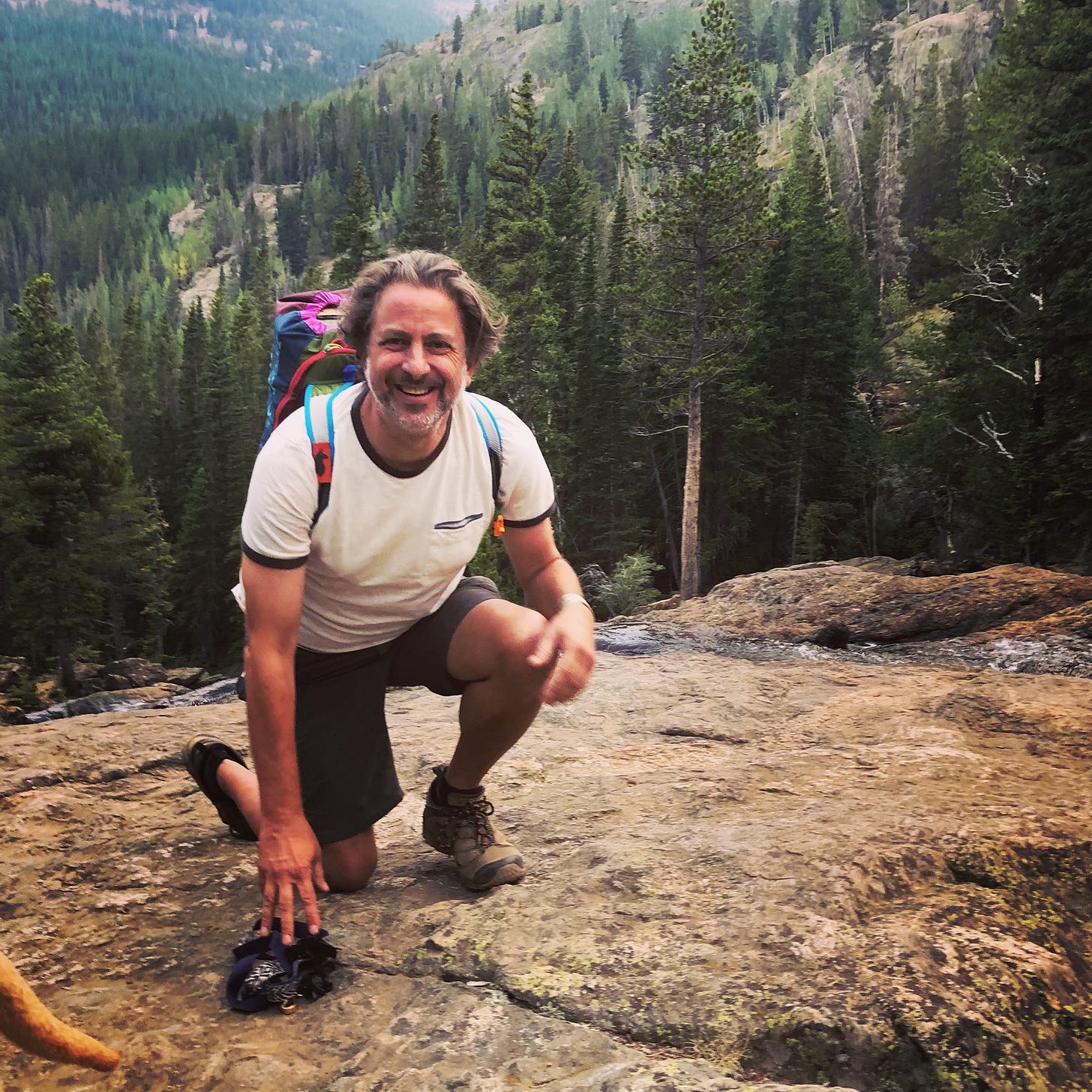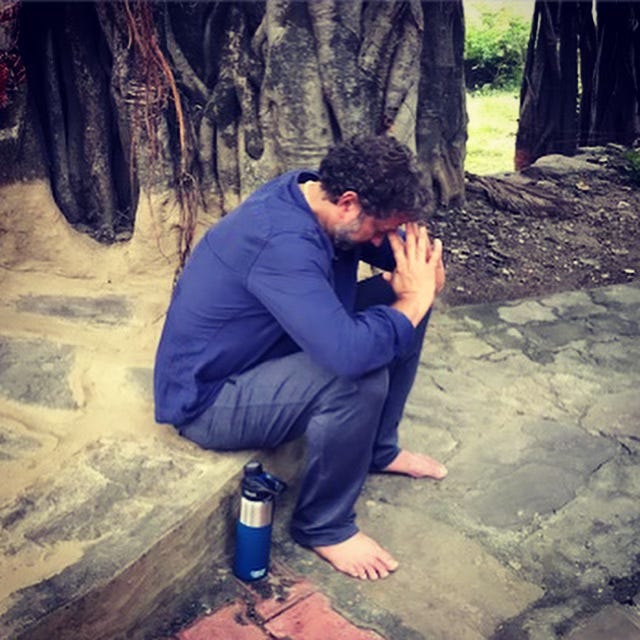How Trusting Google Maps Took Me to the Edge—And What It Taught Me About God, Life, and Everything Else
There's no clear way forward. Just you, the unknown, and the choice to keep going.
A few weeks ago, I found myself on a road I never should have been on. I was driving to see my girlfriend in her mountain town, a drive I had made many times before, mostly on well-maintained highways like I-70. But that day, traffic was backed up, and Google Maps—our modern oracle, brilliant in theory but sometimes dumb as hell—offered me a shortcut.
I clicked without thinking. At first, it seemed fine—just another mountain road curving up through the evergreens. But then something in my gut tightened. The pavement narrowed. The turns got sharper. The climb grew steep. The air thinned. My hands clenched the wheel a little tighter. Then the pavement disappeared altogether. Now it was dirt—loose, shifting, unpredictable. And suddenly, I was on a narrow, winding pass with vertical cliffs dropping 400 feet to the side. My stomach lurched. It was so steep that even with my foot jammed on the brake, my car kept sliding. The tires skidded, gravel kicking up beneath me. I felt the pull of gravity, the quiet terror of losing control. No guardrails. No signs of life. Just ice, wind, and the abyss yawning beside me, waiting.
Later, I read that a few people had lost their lives driving that road, led there by the same damn algorithm.
My phone pulsed red warnings—UNPASSABLE. But I had already come too far. I couldn’t turn around. The only way was forward.
By the time I reached my girlfriend in town, my body was trembling, adrenaline still hammering through my veins. I sat in the driveway, staring at my hands on the wheel, trying to convince myself I was safe. That I had made it.
And then, I laughed. Because honestly, isn't this just how life works? The absurdity of it. That I had blindly trusted an algorithm over my own instincts. That I had driven a road I had no business being on because some disembodied voice told me it was a good idea. And yet, here I was. Alive. Intact. Changed.
This is what the seeker’s path feels like. You think you know where you’re going. You follow the map you’ve been given. But then the road turns, and suddenly, you’re somewhere you never expected—alone, trembling, faced with something
vast and terrifying. There is no way back. You either go forward, or you don’t go at all. And sometimes, you only realize afterward that you made it through.
Let’s be real—life is unpredictable, chaotic, and often completely absurd. And spirituality? It’s not about having some glow-in-the-dark certainty that everything happens for a reason. It’s not about going “toward the light.”
To me, spirituality is about not completely losing your mind when everything around you doesn’t make sense. It’s about cultivating something real inside us so we don’t get swept away by every bit of chaos and noise demanding our attention.
And here's something else—spirituality isn’t just about inner peace. It’s also about clarity and courage. When we go inside and do the real work—when we look at our own shadows, when we connect with something greater than ourselves—we don’t just become more grounded. We become more capable of standing up for what’s right. We get better at saying no to what is toxic, better at rejecting what is false, better at facing what needs to be faced. Maturity isn’t just about love and light—it’s also about the strength to name what is wrong and not be consumed by it. And that? That’s a spiritual practice, too.
I’ve been praying a lot lately. Fifteen years ago, I would have rolled my eyes at that. I thought people who prayed had lost their minds and given up thinking for
themselves. I thought praying meant abandoning reason and critical thinking.
But today, I know this: Praying means you’re human. It means you know you can’t do this alone. I pray to a higher power—a God I don’t fully understand but am learning to lean into—because trying to control everything has never worked. And I don’t think anyone can do this life completely on their own. People who insist on going it alone often become rigid, self-absorbed—and sometimes dangerous to the rest of us. I pray for clarity—when to let go of what I can’t control and when to step up and act on what I can. The things that actually matter. And I write about it here because I know I’m not alone in this.
This is why I created Enlightened-ish—not as a guide with all the answers, but as a space for those of us who are still figuring it out. Those who left behind old maps but still crave something real. Those who wrestle with doubt but refuse to give up on meaning. In my newsletter, I don’t sell certainty. I explore what it means to seek, to question, to stand at the edge of something vast and say, Okay, I’m willing to see what’s here.
This space is for that search. This space is for the seekers.
I think of Nachiketa, the boy in the Katha Upanishad. One of the reasons I love the Upanishads—especially the Katha—is that their wisdom is relational. Wisdom isn’t just something we stumble upon alone in the wilderness; it’s something passed down. And so it makes sense that one of the most profound teachings about life and death starts with a father-son struggle.
Nachiketa was sent to the god of death after calling out his father’s insincerity. His father had been making a grand gesture, giving away possessions to earn divine favor. But the offerings were worthless—old cows that could no longer give milk. Nachiketa saw through the act and asked, Father, to whom will you give me? Irritated, his father answered, I know to whom I will give you. I will give you to Death!
And so Nachiketa went to Death’s house. He waited three days until Death returned. As atonement, Death granted him three wishes. Nachiketa’s first wish was for his father’s peace. His second, for knowledge of the sacred fire, the path
to liberation. Death granted both. But Nachiketa’s third wish unsettled him.
Tell me the truth in this world of life, death, and suffering, the boy asked. Tell me the truth of the soul.
Death resisted. He tried to distract him with riches, kingdoms, pleasures. But Nachiketa was unmoved. These things fade. I want to know what does not.
Seeing the boy’s sincerity, Death relented. He told him: the soul, the atman, is beyond birth and death. It cannot be owned, only remembered. And it is in the remembering that we find our way. The truth is not given—it must be sought. The seeker must step beyond the comforts of what is known. And then he told him something even greater—the seeker and the sought are one and the same.
I have stood in my own version of Death’s house, caught in the space between what I wanted to be true and the raw reality of What Is. And like Nachiketa, I have had to burn away the comfortable illusions I once held onto. I’ve had to let go of the unreal—in order to embrace the Real.
You too? I thought so.
Maybe you don’t know where this road, this life, is leading. Maybe that unsettles you. Maybe it terrifies you.
But the road does not lead away from something. It leads toward something greater than you can imagine.
The road goes somewhere.
Writing has always been one of the ways I find my bearings—turning experience into understanding, uncertainty into something I can hold. If you feel the same pull, Writing the Soul might be for you. It’s an invitation to go deeper, to write not just about your life but from the truth of your experience—to explore, reflect, and find your own way forward through words.
I’d love for you to join me. You can learn more and sign up here: https://bradwetzler.com/writing-the-soul-with-brad-wetzler/
Wherever you are on your journey, trust this: You are not lost. You are becoming.
Writing the Soul: An Eight-Session Course
Writing the Soul begins on April 8. This eight-week memoir and spiritual writing class meets Tuesdays at 11 AM MT (1 PM ET | 10 AM PT | 6 PM UK | 7 PM CET) on Zoom and is designed to help you uncover the deeper truths within your life and story. I’ll be joined by six incredible co-teachers—Emily Rapp Black, memoirist, professor, and author of Poster Child and Still Point of the Turning World; Michelle Dowd, author of Forager; Radha Marcum, poet and author of Bloodline and Pine Soot Tendon Bone; Melissa Walker, author, somatic therapist, and author of Whole-Body Sex: Somatic Sex Therapy and the Lost Language of the Erotic Body; and Adam Guzman-Poole, existential therapist and writer.
Find out more and sign up at bradwetzler.com/writing-the-soul-with-brad-wetzler/
If you haven’t bought my memoir, Into the Soul of the World: My Journey to Healing, yet, I hope you will.
Here’s what author Hampton Sides wrote about it:
“Brad Wetzler has led the very definition of an adventurous life, but in Into the Soul of the World, he gives an unflinching account of his interior adventures. Wetzler’s soulful quest, by turns anguished and transcendent, will resonate with readers around the world who struggle to find purpose and a sense of the holy in the ambient jitter of the digital age.”









Hey Brad! What I want to know is this: if people died going that route how did you continue and turn out alive?
I mean, I’m glad you did, however, when you mentioned those narrow roads and slim passage ways, just hearing that scared the baJesus out of me!